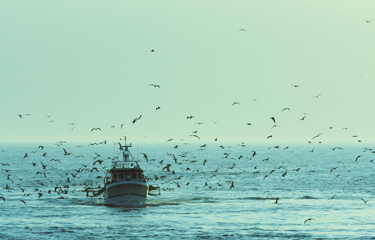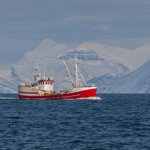Risk pays off: Study finds fishermen who venture to new grounds benefit

In 2009, excessive bycatch of endangered sea turtles in the Gulf of Mexico prompted a five-month closure of the Gulf’s longline fishery. Boat captains unexpectedly found themselves locked out of prime fishing grounds, and were forced to look elsewhere to make a living.
As it turned out, some captains fared better than others in this endeavor. And their experience has implications for fishermen today who are adapting to changing environmental and regulatory conditions.
The captains who had prioritized broadly exploring new fishing grounds in the years prior were also the ones who suffered least when the closures struck, according to a recent study that examined 540,000 position records for 2,500 trips taken by 106 vessels in the Gulf of Mexico both before and during the closure, comparing them to revenue records.
Fishermen who explored broadly had their revenue less severely impacted, and they were likelier to continue fishing. The reason? Those fishermen had information about a greater spatial area and the distribution of fish in those areas — so they had a wider pool of alternatives to draw on.
“Everyone was impacted negatively, but what we found was that ones that had more of a knowledge-base from that exploration strategy were able to have the least negative effect,” James Sanchirico, a professor of environmental science and policy at University of California, Davis and an author of the study, told SeafoodSource.
The world that fishermen inhabit today is changing quickly, and the 2009 closure is just one of the disruptions fishermen now face. The “Blob,” a large patch of warm water off the U.S. West Coast that first appeared in 2013, caused havoc in the marine environment that has lasted years. Around the world, fishery managers will have to deal with the migration of species fleeing warming waters and crossing from one management zone to another. Whale entanglements have forced the spring season closure of the Dungeness crab fishery for the foreseeable future.
The 2009 Gulf of Mexico experience offers lessons for fishermen today who are coping with these changing environmental conditions, regulatory uncertainty, and fishery closures resulting from wildlife protections. Exploring more – and gathering more information – could help them weather uncertain times, according to the research.
“The idea that things are stable doesn’t seem to be holding up right now,” Sanchirico said. “In that environment, there’s value to acquiring that information, and maybe that value is higher than in the past.”
But the benefits of broadly exploring don’t pay off immediately, according to the study, which was published in Nature Communications.
The researchers looked at data from the closure period, along with data from a two-year undisturbed period prior to the closure, and found that captains who explored broadly didn’t perform better than their peers during stable times. The benefits only appeared when conditions changed. The payoff of exploring more was greatest in the immediate aftermath of the closure, and waned as time went on.
The tradeoff that fishermen face – whether to explore new grounds and risk coming back empty-handed, or to stick with known areas and return with a more assured payoff – is common in decision making settings from financial portfolio blending to machine learning to animal foraging, the study notes. Choosing the known option is common.
“People are used to hanging on to the things they know,” Steve Murawski, a professor in the College of Marine Science at the University of South Florida and a co-author on the study, told SeafoodSource. Murawski likened the behavior to commuters taking the same route to the office every morning out of force of habit.
“There are risk-takers and there are not risk takers. Especially if you’re trying to make a payment at the end of the month, how much risk do you take? Most people are not at the extreme end of risk-taking,” he said.
Changing conditions are likely to benefit the risk-takers, though.
“When you had a larger repertoire of places you could go to when places were closed, you made out much better, initially. It’s like money in the bank in the case of a catastrophic closure or event like that,” Murawski said. “People who are locked into a known set of areas – they’re not going to make out as well under these changing conditions. For the guys who were exploring outside the area, they will make out better than the ones who fished the same area all the time.”
Photo courtesy of Paulo Resende/Shutterstock






Share